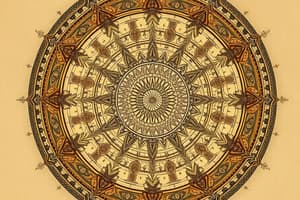Podcast
Questions and Answers
What is the formula to calculate the area of a circle?
What is the formula to calculate the area of a circle?
- A = rac{1}{2} imes ext{radius}^2 (correct)
- A = rac{ ext{diameter}^2}{4}
- A = 2 imes ext{radius}
- A = 3 imes ext{radius}^2
What is the relationship between the diameter and the radius of a circle?
What is the relationship between the diameter and the radius of a circle?
- Diameter = Radius
- Diameter = rac{1}{ ext{Radius}}
- Diameter = 2 imes Radius (correct)
- Diameter = rac{1}{2} imes Radius
Which line in a circle is perpendicular to the radius at the point of contact?
Which line in a circle is perpendicular to the radius at the point of contact?
- Arc line
- Tangent line (correct)
- Secant line
- Chord
What property of circles ensures that the shape remains the same when reflected across its center?
What property of circles ensures that the shape remains the same when reflected across its center?
What is the circumradius of an inscribed polygon equal to?
What is the circumradius of an inscribed polygon equal to?
Which theorem states that an inscribed angle's measure is half that of the intercepted arc's central angle?
Which theorem states that an inscribed angle's measure is half that of the intercepted arc's central angle?
What do the sum of the angles of a cyclic quadrilateral equal to?
What do the sum of the angles of a cyclic quadrilateral equal to?
What do circles help construct when intersecting a line?
What do circles help construct when intersecting a line?
In a polygon with $n$ sides, what is the sum of its angles equal to?
In a polygon with $n$ sides, what is the sum of its angles equal to?
What can circles be used to calculate in real-world problems?
What can circles be used to calculate in real-world problems?
Flashcards are hidden until you start studying
Study Notes
Mastering Maths: Geometry and Circles
Circles are a fundamental and beautiful concept within the realm of geometry, and they've captivated mathematicians for millennia. In this article, we'll dive into the core ideas of circles and explore some of their intriguing properties.
The Circle's DNA: Definitions and Properties
A circle is a two-dimensional shape with every point on its edge (called the circumference) equidistant from its center. The distance from the center to any point on the circumference is called the radius. A circle with a radius of 1 unit is called a unit circle.
A circle's diameter is the distance between any two opposite points on its edge and equals twice the radius. A circle's area can be calculated using the formula (A = \pi r^2), where (r) is the radius.
Circles have the following notable properties:
- All chords (lines connecting any two points on the circumference) pass through the center of the circle.
- The length of a chord is equal to twice the distance between its midpoint and the center.
- Circles are symmetric, meaning the shape is the same when reflected across its center or any line passing through it.
- Circumference can be calculated using the formula [C = 2 \pi r], where (C) is the circumference and (r) is the radius.
- Tangent lines are perpendicular to the radius at the point of contact and never intersect the circle more than once.
Circles and Their Circles: Inscribed and Circumscribed Polygons
A polygon is any closed shape with a finite number of straight sides and angles. A polygon can be inscribed in a circle, meaning all of its vertices lie on the circle's edge, or circumscribed about a circle, meaning its sides are tangent to the circle.
The circumradius of an inscribed polygon, called the inradius, is equal to the radius of the circle in which it is inscribed, while the inradius of a circumscribed polygon is equal to the radius of the circle circumscribing it.
Geometric Relationships: Circle Theorems and Constructions
Circles have a variety of theorems that help us better understand their relationships with other shapes. Two notable theorems are:
- Inscribed Angle Theorem: An inscribed angle's measure is half that of the intercepted arc's central angle.
- Circle's Angles: A line intersecting a circle makes equal interior and exterior angles with the circle's diameter.
With these theorems, we can prove facts such as the angles of a cyclic quadrilateral sum to (360^\circ) and the sum of the angles of a polygon with (n) sides is ((n-2) \cdot 180^\circ).
We can also use circles to construct other shapes, such as drawing a perpendicular bisector of a line segment, or constructing a line tangent to three circles.
Solving Real-world Problems with Circles
Circles offer a practical way to solve various real-world problems. For instance, we can use circles to find the area of a roadway, calculate the volume of a water tank, or find the distance a ball has been thrown.
Circles are fundamental to many branches of mathematics. They are an essential tool in algebra, calculus, and trigonometry, and they provide a foundation for more complex geometric concepts such as conic sections and higher-dimensional shapes.
So, the next time you come across a math problem involving circles, remember that these beautiful shapes have captivated mathematicians for centuries and continue to be an integral part of our understanding of the world around us. do not contain information directly relevant to maths or geometry, so they are not incorporated into this article. The information in is not relevant to geometry or circles and is therefore not included.
Studying That Suits You
Use AI to generate personalized quizzes and flashcards to suit your learning preferences.




